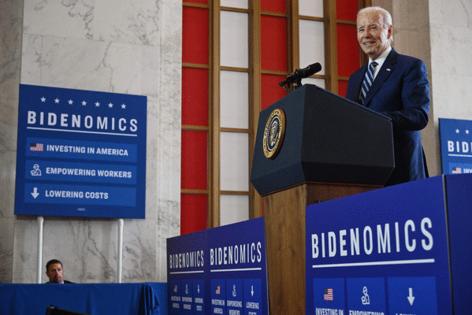Editorial: The US economy is the envy of the world, but too many Americans have forgotten why
Published in Op Eds
It might be amusing if it weren’t so vexing to see news reporters interview people shopping for luxury items, eating out at fancy restaurants, or vacationing at some resort while complaining about how bad the U.S. economy is.
Compared to what?
Just as frustrating but more pertinent are the countless interviews with people who say they are struggling to pay their bills. As the Bible says, “the poor you will always have with you,” which means surveying those truly in need may not be the best way to gauge a country’s economy.
Even so, polls consistently suggest Americans are so concerned about pocketbook issues that the economy is the central issue that may determine their vote for president.
It’s as if those being polled have completely forgotten the economic quagmires this country struggled to get out of during both the Great Recession and the COVID-19 pandemic. The impact of those calamities on businesses, prices, and employment provides needed context to accurately view today’s economy.
The recession from December 2007 to June 2009 was the nation’s longest since World War II. The unemployment rate jumped from 5% to 10%, the S&P 500 stock exchange index dropped 57%, and the net worth of American households and nonprofits fell from $69 trillion to $55 trillion.
That was the economy President Barack Obama inherited from President George W. Bush.
Obama’s response included the American Recovery Act, which was signed into law in 2009 despite not receiving a single Republican vote in the House and only three in the Senate. The $800 billion stimulus package included tax cuts, loan guarantees, financial assistance to families, and funding for infrastructure, renewable energy, and small businesses. It helped bring the recession to an earlier end.
The virus that led to the COVID-19 pandemic was first discovered in December 2019 in Wuhan, China. The disease eventually made its way to the United States, left more than 1.2 million Americans dead, and sent the U.S. economy into another tailspin.
For the second time in only 11 years, America again found itself in a history-making recession. By April 2020, the unemployment rate reached an unprecedented 14.8%. Some workers were more affected than others. With most people staying home to avoid being infected, the unemployment rate for the leisure and hospitality industry was 39.3%.
That was the economy President Joe Biden inherited from President Donald Trump.
Trump signed legislation before leaving office to keep the economy from falling into an abyss, but not before calling the bill a “disgrace.” Three subsequent stimulus bills signed into law by Biden have been credited with helping to make the two-month COVID-19 recession the shortest in U.S. history. Biden’s American Rescue Act of 2021 pushed the economy further from a pandemic-related collapse.
So how’s the U.S. economy doing now?
September’s 2.4% annual inflation rate is lower than it was before the pandemic. So is the September unemployment rate of 4.1%, though that’s slightly higher than the 3.8% it was a year ago. More than 250,000 jobs were added to U.S. payrolls in September, which far exceeded economists’ predictions of 140,000 new jobs, and helped push the Dow Jones Industrial Average to a record high.
Pennsylvania hasn’t done as well as the nation as a whole. Fifty-one of its 67 counties lost jobs during the pandemic, and most haven’t recovered. But the state’s 3.4% unemployment rate is lower than the national average, and the number of nonfarm jobs in the state reached a record high of more than 6.1 million this year, with most of those new jobs, 4,500, in education and health services.
Those numbers don’t mean we shouldn’t worry about the economy.
Too many people are either unemployed or not making enough money to pay their bills. And who knows when another pandemic or some other unforeseen crisis will steer financial markets into a nosedive that leads to massive job losses, less consumer spending, bank bailouts, or other drastic measures to avoid another recession, if not a depression?
Even when you consider those calamitous possibilities, however, there’s more to like than fear about today’s economy. So why do polls suggest most Americans think the U.S. economy is in terrible shape?
Maybe because they don’t know what to believe. Too many rely on dubious online news sources despite knowing the internet is rife with fake information and images. Too many trust political leaders who blatantly manipulate the truth for personal gain. Too many don’t take the extra time needed to find the truth.
Do that and they will discover the U.S. economy, with all its challenges, remains the envy of the world.
©2024 The Philadelphia Inquirer, LLC. Visit at inquirer.com. Distributed by Tribune Content Agency, LLC.




























































Comments